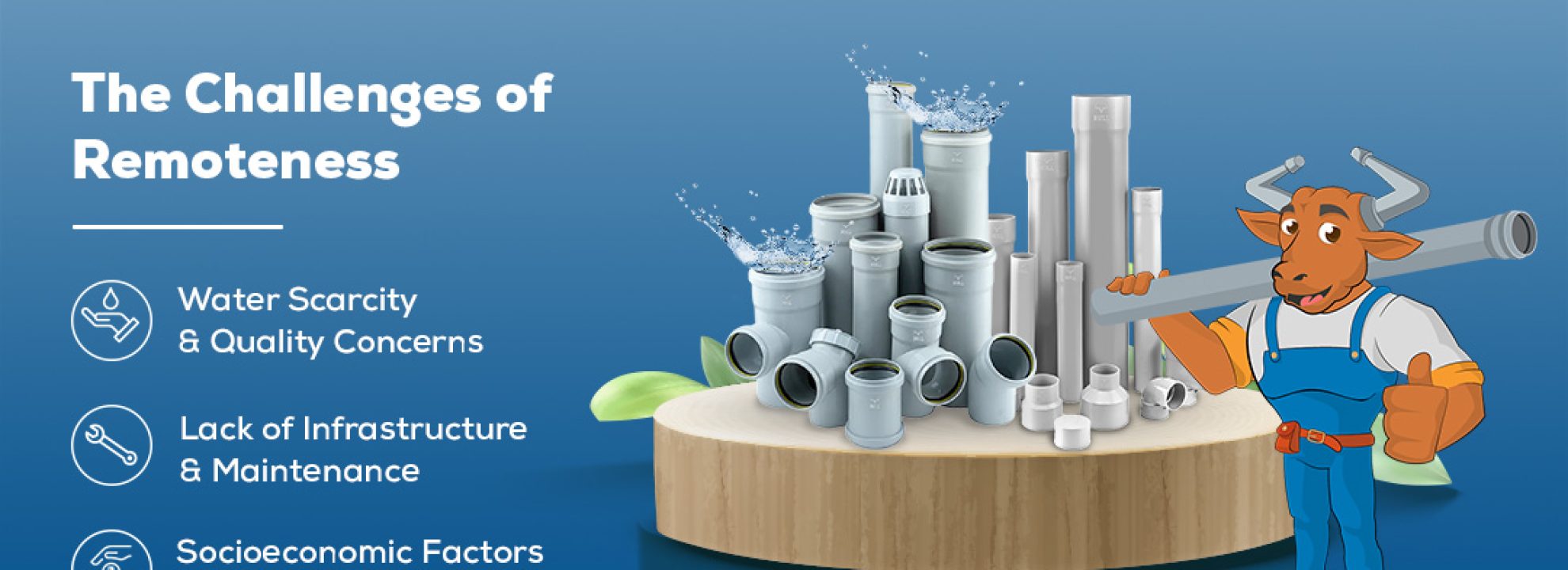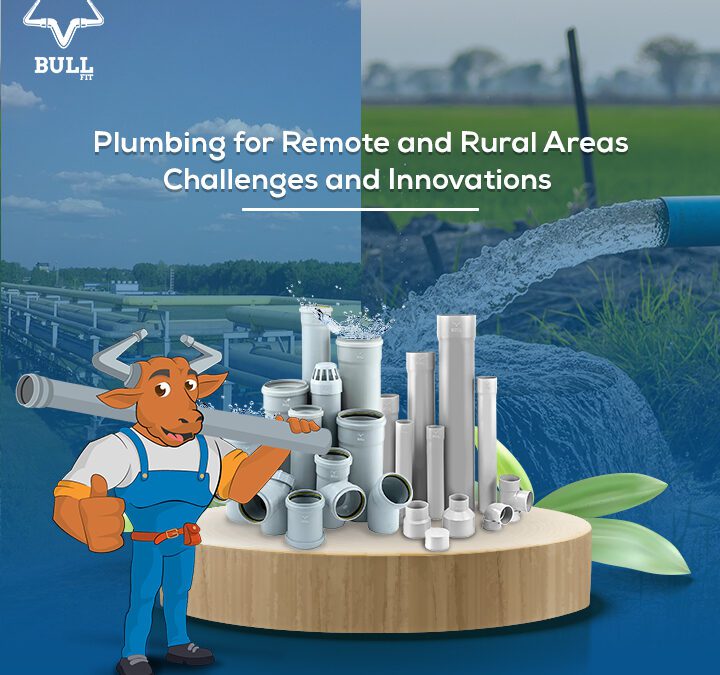
3 Maintenance Tips for Water Storage Tanks to Ensure Longevity
April 22, 2024
The Importance of High-Quality Agri Pipes and Fittings in Modern Agriculture
June 4, 2024Plumbing Challenges and Innovations for Remote and Rural Areas
In the vast expanse of India’s diverse landscape, remote and rural areas often face unique plumbing challenges when it comes to plumbing infrastructure and access to essential water resources. These regions, characterized by their isolation and limited connectivity, require innovative solutions tailored to their distinct needs and geographical constraints.
The Challenges of Remoteness
Remote and rural areas in India are often characterized by rugged terrain, sparse populations, and limited infrastructure development. These factors pose significant obstacles to the establishment and maintenance of plumbing systems. The vast distances involved in transporting materials and personnel can drive up costs and logistical complexities, making conventional plumbing solutions less feasible.
Water Scarcity and Quality Concerns
One of the most pressing challenges in remote and rural areas is water scarcity. Many of these regions are located in arid or semi-arid zones, where access to reliable water sources is limited. Additionally, the quality of available water may be compromised due to contamination from natural sources or lack of proper treatment facilities. Ensuring a consistent supply of clean water for drinking, sanitation, and agricultural purposes is crucial for the well-being and development of these communities.
Lack of Infrastructure and Maintenance
Remote and rural areas often lack the necessary infrastructure to support conventional plumbing systems. The absence of centralized water distribution networks, sewage treatment facilities, and reliable power sources can hinder the implementation and operation of traditional plumbing solutions. Moreover, the remoteness of these areas makes regular maintenance and repair challenging, potentially leading to system failures and disruptions in water supply.
Socioeconomic Factors and Affordability
Many remote and rural communities in India face socioeconomic challenges, including high poverty levels and limited access to resources. Affordable and sustainable plumbing solutions are essential to ensure equitable access to water resources and sanitation facilities. Conventional systems may be cost-prohibitive for these communities, necessitating innovative approaches that balance functionality, durability, and affordability.

Innovative Solutions for Remote and Rural Plumbing
Addressing the plumbing needs of remote and rural areas requires a multifaceted approach that combines traditional practices with modern technological innovations. Here are some potential solutions:
Decentralized Water Treatment Systems Decentralized water treatment systems, such as household-level filtration and purification units, can be a viable solution for providing clean water in areas without centralized infrastructure. These systems can be tailored to the specific water quality challenges of each region and powered by renewable energy sources like solar or wind.
Rainwater Harvesting and Groundwater Management In regions with limited surface water sources, rainwater harvesting and groundwater management can play a crucial role. Rainwater collection systems, coupled with proper storage and treatment, can provide a reliable water source for household use. Sustainable groundwater management practices, such as recharging aquifers and protecting wells, can help ensure long-term water security.
Low-Cost and Durable Piping Solutions The adoption of cost-effective and durable piping solutions, such as those offered by Bull Pipes, including their innovative Bull Fit Pipes range, can significantly improve the resilience and longevity of plumbing systems in remote and rural areas. Bull Fit Pipes are designed with a unique push-fit technology that allows for quick and easy installation without the need for specialized tools or skilled labor. These pipes are made from high-quality materials like UPVC, ensuring durability and resistance to harsh environmental conditions. Additionally, Bull Fit Pipes are leak-proof and corrosion-resistant, making them an ideal choice for water transportation and secure fittings in remote areas.
Off-Grid Sanitation Systems In areas without centralized sewage systems, off-grid sanitation solutions like composting toilets, septic tanks, and constructed wetlands can provide sustainable alternatives. These systems can help reduce water consumption, minimize environmental impact, and promote better sanitation practices.
Community-Based Maintenance and Training Engaging local communities in the maintenance and operation of plumbing systems can enhance their sustainability and longevity. Providing training and capacity-building programs can empower residents to take ownership of their water and sanitation infrastructure, ensuring timely repairs and maintenance. This is especially crucial for innovative solutions like Bull Fit Pipes, as community members can learn the simple installation and maintenance procedures, reducing the need for specialized technicians in remote areas.
Collaborative Efforts and Stakeholder Engagement
Addressing the plumbing needs of remote and rural areas requires collaborative efforts among various stakeholders, including government agencies, non-governmental organizations (NGOs), community leaders, and private sector partners like Bull Pipes. By fostering open communication and involving all stakeholders in the decision-making process, sustainable and context-specific solutions can be developed. Bull Pipes can play a crucial role by providing technical expertise, training, and support for the implementation of their innovative piping solutions in remote areas.
Government Initiatives and Policy Support
The Indian government has implemented several initiatives aimed at improving access to water and sanitation in rural areas, such as the Jal Jeevan Mission and the Swachh Bharat Mission (Gramin). However, sustained policy support and increased investment are necessary to expand these efforts and address the unique challenges faced by remote and isolated communities. Encouraging the use of innovative and cost-effective solutions like Bull Fit Pipes can help maximize the impact of these government initiatives.
The Road Ahead: Ensuring Equitable Access
Providing plumbing solutions for remote and rural areas is not only a matter of infrastructure development but also a crucial step towards ensuring equitable access to water resources and sanitation facilities.
Ultimately, addressing the plumbing challenges of remote and rural areas requires a holistic and context-specific approach. By combining traditional practices with modern technological innovations from companies like Bull Pipes, and fostering collaboration among stakeholders, India can ensure that even the most isolated communities have access to reliable, sustainable, and affordable plumbing solutions, promoting better health, well-being, and economic development.


